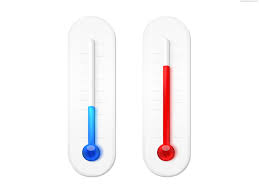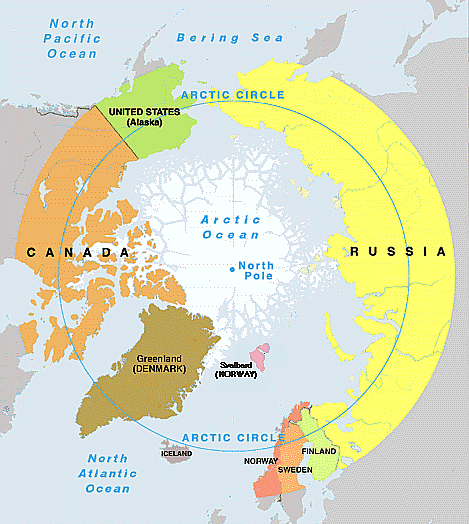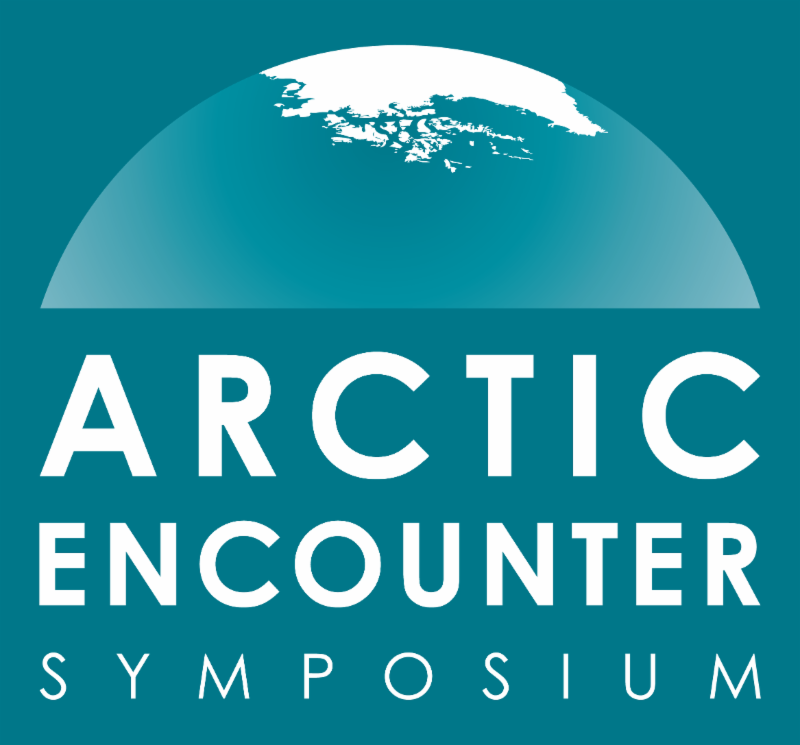|
|
|
|
|
|
|
|
|
No Arctic-science events are announced today.
|
Media
 Arctic Temperatures Soar 45 Degrees Above Normal, Flooded by Extremely Mild Air on All Sides. Arctic Temperatures Soar 45 Degrees Above Normal, Flooded by Extremely Mild Air on All Sides. While the Eastern United States simmers in some of its warmest February weather ever recorded, the Arctic is also stewing in temperatures more than 45 degrees above normal. This latest huge temperature spike in the Arctic is another striking indicator of its rapidly transforming climate. On Monday and Tuesday, the northernmost weather station in the world, Cape Morris Jesup at the northern tip of Greenland, experienced more than 24 hours of temperatures above freezing according to the Danish Meteorological Institute. The Washington Post
Climate Change Will Force Mammals to Get Picky About Mating. For obvious reasons, it pays for prey to blend in with the environment around them. For individual animals, it means hunters won't spot them as easily. Entire species benefit, though, when the survivors make it to mating season to pass on their successful genes. Anthropogenic climate change is messing with the system. As the planet warms, cold regions that used to be white and snowy in the winter are staying brown. Quartz Media
 Japan, Finland Affirms Cooperation on North Korea, Arctic Policy. Japan, Finland Affirms Cooperation on North Korea, Arctic Policy. The foreign ministers of Japan and Finland agreed Wednesday to work together in tackling North Korea's development of nuclear weapons, including through the full implementation of U.N. sanctions. "I want us to closely coordinate with each other to deal with North Korea and other international challenges," Foreign Minister Taro Kono said during joint comments to the press ahead of a dinner with Finnish counterpart Timo Soini. Japan Times
Nitrate Flux in the Arctic Not Following the Decreasing NOx Emissions in Neighboring Countries. Aerosols less than 2.5 micrometers are known as particulate matter (PM) 2.5 and are hazardous to human health. Large aerosol particles, on the other hand, help form sun-blocking clouds that cool Earth's surface. Concentrations of sulfide oxide (SOx) and nitrogen oxide (NOx) which can form aerosols were on the rise from the Industrial Revolution of the mid-18th century to 1980, causing serious air pollution in the 1970s and 1980s. But regulations imposed by the US, European countries and other developed nations have led to a reduction in SOx and NOx emissions since 1990s. Science Daily
|
|
Future Events
A Changing Arctic, Registration closes March 1, 2018 (University of Oslo). The University of Oslo will offer a course this summer on the changing Arctic. Registration closes March 1st. The Arctic region has gained increased public, political, commercial and academic interest over the last decade. High-energy prices and technological advances have made it possible, if not yet commercially attractive, to exploit petroleum resources in the area. Climate change and the retraction of the polar ice have opened new sea transportation routes, considerably shortening the distance from Europe and North America to parts of Asia. The demand for high-quality white fish from the Barents Sea is steadily rising on international markets. States, international organizations and private interests, including emerging economies in Asia, now show a keen interest in the High North and the Arctic at large.
** New this week ** Communities in Harm's Way: Addressing Environmental Change and Extreme Weather Events, March 1, 2018 (Washington, DC USA). The Board on Environmental Change and Society of The National Academies of Sciences, Engineering, and Medicine In collaboration with Inter-Agency Forum on Climate Risks, Impacts & Adaptation is hosting this seminar to explore policy and community response mechanisms to prepare for and address threats to the built environment and local communities as a result of environmental change and extreme weather events. Speakers include Joel Neimeyer of the Denali Commission and F. Stuart Chapin, III, of the Institute of Arctic Biology at the University of Alaska, Fairbanks.
** New this week ** Marlene Laruelle (George Washington University): Russia's Arctic Ambitions. Domestic Factors and Foreign Policy Strategies, March 6, 2018 (Washington, DC USA). Russia's ambitions for the Arctic have been shaping the geopolitical landscape of the region, both in terms of securitization, governance, and territorial disputes. Yet many aspects of Russia's Arctic policy are based on on domestic imperatives such as that of regional development, transport and infrastructure sustainability, and challenging population management. Moscow envisions shipping routes and energy projects as a leverage for development, but several serious economic, social and climatic elements hamper these projects. This presentation will discuss the dominant role of domestic factors, and their articulation with Russia's foreign policy stances for the Arctic. This event is part of the ARCUS DC Arctic Research Seminar Series.
7th Annual Fletcher Arctic Conference, March 9, 2018 (Medford, MA USA). The Fletcher School is convening its seventh annual Arctic Conference on March 9, 2018 as a platform for policymakers, business leaders, academics, and students to address the implications of a volatile Arctic. Past conferences have addressed the environmental, economic and social challenges posed, drawing upon the insights of keynote speakers like President Ólafur Ragnar Grímsson of Iceland and then-U.S. Senator John Kerry, as well as interdisciplinary expert panelists from the Pan-Arctic region. Last year, the Arctic Conference drew more than 200 participants from diverse backgrounds to engage on key Arctic issues. With this year's focus is to explore the concept of going Innovation and Sustainable Development in the Arctic through discussions and breakout panels focused on present and future concerns of the region.
Methane Variation Over Terrestrial and Marine Arctic Areas (2010-2016): IASI Satellite Data, March 13, 2018 (Silver Spring, Maryland USA). There is evidence that methane is being released into the atmosphere at high northern latitudes as the Arctic warms up. Methane concentration in the Arctic lower troposphere was estimated between 2010 and 2016 with the Infrared Atmospheric Sounding Interferometer (IASI), a thermal IR spectrometer orbiting the Earth on a satellite MetOp-A. The area studied encompasses the Barents/ Kara seas and the Wester Siberian Lowland (WSL), one of the most important methane sources in high northern latitudes. This event is a NOAA's National Ocean Service Science Seminar.
48th International Arctic Workshop 2018, April 5-6, 2018 (Boulder, Colorado USA). Hosted by the Institute of Arctic and Alpine Research (INSTAAR), University of Colorado The 2018 Arctic Workshop welcomes a community that includes all career stages - from student to distinguished world-class expert. The Arctic Workshop is open to all interested in high latitude environments, including those of the past, present, and future. Talks and posters on all aspects of Arctic science, social science, and engineering are invited, including Arctic and Antarctic climate, anthropology, atmospheric chemistry, engineering and infrastructure, environmental geochemistry, paleoenvironment, sociology, archeology, geomorphology, hydrology, glaciology, soils, ecology, oceanography, Quaternary history and more. If you are studying the Arctic, this is the conference for you.
 5th Annual Arctic Encounter Symposium (AES), April 19-20, 2018 (Seattle, WA, USA) 5th Annual Arctic Encounter Symposium (AES), April 19-20, 2018 (Seattle, WA, USA) - The Arctic Encounter, the largest annual Arctic policy conference in the U.S., will convene policymakers, industry leaders, scientists, Arctic artists and musical performers, and other stakeholders to debate and discuss emerging Arctic challenges and opportunities including policy, innovation, security, and development. The mission of AES is to raise awareness, engage challenges, and develop solutions for the future of the Arctic region and the people who live there. The 5th annual AES will take place in downtown Seattle at the Bell Harbor International Conference Center on Pier 66.
2018 North by North Festival, April 23-29, 2018 (Anchorage, Alaska USA). The North by North Festival captures the spirit of Alaska and the Arctic - to address our challenges and opportunities with Northern innovation and resilience, to build on a rich history and to ensure a future full of promise. The Festival is for the North, and organized by Northerners, with goals of sustainability, livability and growth. The Festival brings innovators from across Alaska, the nation and other Arctic regions to collaborate and address local and circumpolar challenges. Through knowledge, governance, business, design, film, music, food, literature and art, we celebrate the North.
Council on Earth Cryology, May 15-16, 2018 (Moscow, Russian Federation). Scientific council on Earth cryology of Russian Academy of Sciences together with Department of Geocryology of Faculty of Geology of Lomonosov Moscow State University, Institute of the Earth Cryosphere, the Tyumen Scientific Senter, Melnikov Permafrost Institute (Yakutsk) of the Siberian Branch of the Russian Academy of Science holds on May 15 - 16, 2018 an enlarged meeting with participation of the Russian and foreign scientists, engineers and experts: "Current problems of geocryology." The meeting of Scientific council on Earth Cryology of RAS has the status of the International meeting. The publication of materials in the collection of reports is planned. Submissions (Submission Form), offers on cooperation, support of a conference and papers (Sample of Paper) to e-mail: cryoconf18@gmail.com
The Effects of Climate Change on the World's Oceans, June 4-8, 2018 (Washington, DC USA). The 4th International Symposium will bring together experts from around the world to better understand climate impacts on ocean ecosystems - and how to respond. The event is hosted by a variety of groups including International Council for the Exploration of the Sea (ICES), N. Pacific Marine Science Organization (PICES), Intergovernmental Oceanographic Commission of UNESCO (IOC), and Food and Agriculture Organization of the United Nations (FAO).
 International Conference on Arctic Margins (ICAM) VIII, June 11-14, 2
The international Conference on Arctic Margins (ICAM) is a forum for earth scientists who study the Arctic. It was founded to help understand the little known Arctic geology and to foster cooperation and collaboration among Arctic researchers. There have been 7 meetings since its inception in 1991. See here for more information.
 POLAR 2018, June 15-27, 2018 (Davos, Switzerland). POLAR2018 is a joint event from the Scientific Committee on Antarctic Research (SCAR) and the International Arctic Science Committee (IASC). The SCAR meetings, the ASSW and the Open Science Conference will be hosted by the Swiss Federal Institute for Forest, Snow and Landscape Research WSL under the patronage of the Swiss Committee on Polar and High Altitude Research. The WSL Institute for Snow and Avalanche Research SLF is organizing POLAR2018. POLAR 2018, June 15-27, 2018 (Davos, Switzerland). POLAR2018 is a joint event from the Scientific Committee on Antarctic Research (SCAR) and the International Arctic Science Committee (IASC). The SCAR meetings, the ASSW and the Open Science Conference will be hosted by the Swiss Federal Institute for Forest, Snow and Landscape Research WSL under the patronage of the Swiss Committee on Polar and High Altitude Research. The WSL Institute for Snow and Avalanche Research SLF is organizing POLAR2018.
Arctic Observing Summit 2018, June 24-26, 2018 (Davos, Switzerland). The Arctic Observing Summit (AOS) is a high-level biennial summit that provides a platform to address urgent and broadly recognized needs of Arctic observing across all components of the Arctic system. AOS 2018 will be held in Davos, Switzerland ( June 24-26) and will focus on pressing issues in the implementation and support of sustained observations that can be addressed through a business-case lens. To that end, short submissions are requested that address any and all aspects of the overarching theme and sub-themes. Additional information can be found here.
17th International Congress of Circumpolar Health (ICCH17), August 12-15, 2018 (Copenhagen, Denmark). The ICCH congresses are held every third year in different locations in the circumpolar area and represent the largest scientific meetings worldwide on circumpolar health. The ICCH congresses serve as the primary source of information exchange and scholarly communication in issues relating to circumpolar health. More than 750 participants generally register and participate in each Congress, and more than 400 scientific papers or posters are usually presented.
UArctic Congress 2018, September 3-7, 2018 (Oulu and Helsinki, Finland).
The UArctic Congress 2018 will bring together key UArctic meetings and a science conference into one single gathering, including business meetings of the Council of UArctic, Rectors' Forum, Student Forum, and Thematic Networks & UArctic Institutes Leadership Team. The Congress is an integral part of the Finland's Arctic Council chairmanship program, and open to the public. The event will highlight the themes and priorities of the Finnish chairmanship, including the goals of the United Nations' 2030 Agenda for Sustainable Development, and the Paris Agreement under the UN Framework Convention on Climate Change.
The second Arctic Biodiversity Congress is hosted by the Conservation of Arctic Flora and Fauna (CAFF), the biodiversity working group of the Arctic Council, and the Ministry of the Environment, Finland. The second Arctic Biodiversity Congress will build on the success of the first Congress, held in 2014 in Trondheim, Norway, and will bring together scientists, policymakers government officials, Indigenous representatives, Traditional Knowledge holders, industry, non-governmental organizations, and others to promote the conservation and sustainable use of Arctic biodiversity.
|
|

  
4350 N. Fairfax Drive, Suite 510
Arlington, VA 22203, USA
External links in this publication, and on the USARC's World Wide Web site ( www.arctic.gov) do not constitute endorsement by the US Arctic Research Commission of external Web sites or the information, products or services contained therein. For other than authorized activities, the USARC does not exercise any editorial control over the information you may find at these locations. These links are provided consistent with the stated purpose of this newsletter and the USARC Web site.
|
|
|
|
|
|
|
|
|
 Arctic Temperatures Soar 45 Degrees Above Normal, Flooded by Extremely Mild Air on All Sides. While the Eastern United States simmers in some of its warmest February weather ever recorded, the Arctic is also stewing in temperatures more than 45 degrees above normal. This latest huge temperature spike in the Arctic is another striking indicator of its rapidly transforming climate. On Monday and Tuesday, the northernmost weather station in the world, Cape Morris Jesup at the northern tip of Greenland, experienced more than 24 hours of temperatures above freezing according to the Danish Meteorological Institute. The Washington Post
Arctic Temperatures Soar 45 Degrees Above Normal, Flooded by Extremely Mild Air on All Sides. While the Eastern United States simmers in some of its warmest February weather ever recorded, the Arctic is also stewing in temperatures more than 45 degrees above normal. This latest huge temperature spike in the Arctic is another striking indicator of its rapidly transforming climate. On Monday and Tuesday, the northernmost weather station in the world, Cape Morris Jesup at the northern tip of Greenland, experienced more than 24 hours of temperatures above freezing according to the Danish Meteorological Institute. The Washington Post Japan, Finland Affirms Cooperation on North Korea, Arctic Policy. The foreign ministers of Japan and Finland agreed Wednesday to work together in tackling North Korea's development of nuclear weapons, including through the full implementation of U.N. sanctions. "I want us to closely coordinate with each other to deal with North Korea and other international challenges," Foreign Minister Taro Kono said during joint comments to the press ahead of a dinner with Finnish counterpart Timo Soini. Japan Times
Japan, Finland Affirms Cooperation on North Korea, Arctic Policy. The foreign ministers of Japan and Finland agreed Wednesday to work together in tackling North Korea's development of nuclear weapons, including through the full implementation of U.N. sanctions. "I want us to closely coordinate with each other to deal with North Korea and other international challenges," Foreign Minister Taro Kono said during joint comments to the press ahead of a dinner with Finnish counterpart Timo Soini. Japan Times



